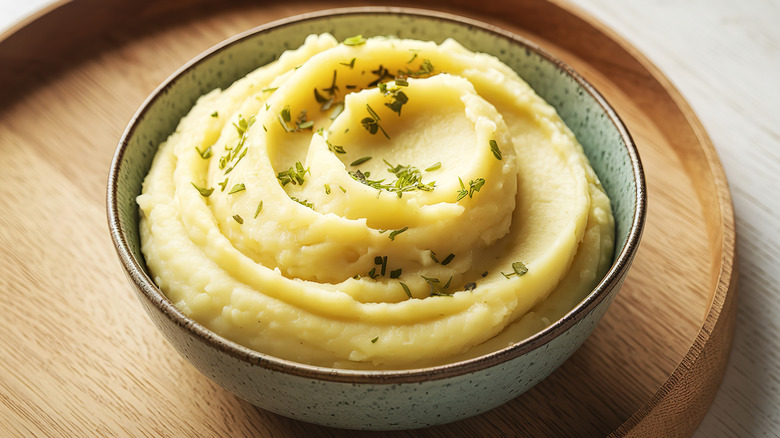Bobby Flay's Thanksgiving Secret For Extra Creamy Mashed Potatoes Is This Unexpected Step
Thanksgiving is approaching, and millions of stressed-out home cooks are turning to their favorite celebrity chefs for advice. Food Network delivered: Bobby Flay shared his chef-approved tip for the best mashed potatoes in a video posted on the network's Instagram account. The secret? "After you boil the potatoes, what I like to do is put them in the oven and dry them out so that they're not waterlogged," Flay explained.
Soggy potato chunks lead to soggy, bland mashed potatoes. The potatoes can only absorb so much liquid before they get thin and runny. Drying them out before adding milk and butter makes room for more flavorful fats.
You can dry out your potatoes without heating up the oven or busting out a baking tray, though, if you haven't got oven space to spare. After you drain the potatoes, simply return them to the saucepan and let the remaining water evaporate over low heat. Even for Flay, the oven is optional: One of his own mashed potato recipes uses the stovetop method. Either way, don't keep the potatoes on the heat too long. It will only take a couple of minutes for the water to evaporate.
How to avoid soggy mashed potatoes
Evaporating excess water is a helpful hack, but you should strive to avoid soggy potatoes from the start. Start your potatoes in cold water, then bring them to a moderate simmer. Stir them regularly and avoid letting the water come to a roaring boil. This will ensure that the potatoes cook evenly because if the outsides cook too quickly, they'll become crumbly, starchy, and waterlogged.
Bobby Flay recommends using a ricer or food mill to mash your potatoes, but you can use a good old-fashioned potato masher, too. Just don't break out the power tools. The creamiest Thanksgiving mashed potatoes won't be achieved with blenders, electric mixers, and food processors — these devices will just overwork the potatoes and cause a gummy, starchy texture. All that effort you've put towards achieving the perfect moisture-to-potato ratio will go to waste if your potatoes have the consistency of rubber cement.
Warm butter, milk, and any other liquids before adding them to the potatoes, and incorporate them slowly. Different factors affect the amount of moisture that the potatoes can absorb, so the amount your recipe calls for could be too much (or too little) for you. It might seem like a lot to consider for something as simple as mashed potatoes, but don't stress about it too much. Even if you mess up, a simple sprinkling of potato flakes can thicken watery mashed potatoes.

